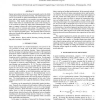Free Online Productivity Tools
i2Speak
i2Symbol
i2OCR
iTex2Img
iWeb2Print
iWeb2Shot
i2Type
iPdf2Split
iPdf2Merge
i2Bopomofo
i2Arabic
i2Style
i2Image
i2PDF
iLatex2Rtf
Sci2ools
149
Voted
ICASSP
2010
IEEE
2010
IEEE
Hierarchical dictionary learning for invariant classification
Sparse representation theory has been increasingly used in the fields of signal processing and machine learning. The standard sparse models are not invariant to spatial transformations such as image rotations, and the representation is very sensitive even under small such distortions. Most studies addressing this problem proposed algorithms which either use transformed data as part of the training set, or are invariant or robust only under minor transformations. In this paper we suggest a framework which extracts sparse features invariant under significant rotations and scalings. The algorithm is based on a hierarchical architecture of dictionary learning for sparse coding in a cortical (log-polar) space. The proposed model is tested in supervised classification applications and proved to be robust under transformed data.
| Added | 06 Dec 2010 |
| Updated | 06 Dec 2010 |
| Type | Conference |
| Year | 2010 |
| Where | ICASSP |
| Authors | Leah Bar, Guillermo Sapiro |
Comments (0)

